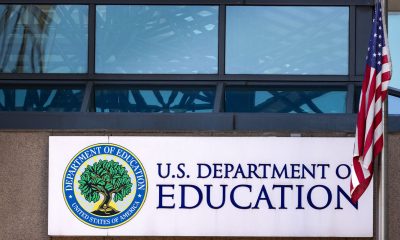#NNPA BlackPress
Fearing a Recession, Many Express Misgivings about a Looming Downturn
NNPA NEWSWIRE — “The United States currently has certain interim policies and tools, such as automatic stabilizers like the Earned Income Tax Credit and Unemployment Insurance that are automatically triggered to inject funds into the economy and don’t require any government action to take hold in the event of a downturn,” said Mila Garcia, a finance expert, and the founder of iPaydayLoans.

By Stacy M. Brown, NNPA Newswire Senior National Correspondent
@StacyBrownMedia
In the past, it hasn’t always been clear when a recession loomed, let alone when it had already begun.
However, the silver lining now is that unlike in previous downturns, the Federal Reserve and the U.S. government have already taken action by making critical adjustments to fiscal and monetary policies to regulate economic activity.
“The United States currently has certain interim policies and tools, such as automatic stabilizers like the Earned Income Tax Credit and Unemployment Insurance that are automatically triggered to inject funds into the economy and don’t require any government action to take hold in the event of a downturn,” said Mila Garcia, a finance expert, and the founder of iPaydayLoans.
“And while such programs have proven effective, they should have an even stronger effect with congressional action being taken alongside them. So, if a downturn does hit, we can at least expect to be less vulnerable to economic troubles than before,” Garcia stated.
Amid rising inflation and concerns of a looming recession, many have shared their fears and what America should learn from the pandemic-induced economic downturn.
“Given that Americans are struggling to pay their medical bills, inflation is rising quickly at a pace of 9 percent, and gas and food prices are at all-time highs, this subject is one of the most popular and alarming ones for all Americans,” said Rinor Zejna, a digital public relations specialist.
Zejna offered some findings from research regarding bankruptcy in the United States, noting that one in three Americans struggle to pay medical bills and 750,000 file for bankruptcy each year.
“Medical debt is the number one cause of bankruptcies,” Zejna offered. “And 58 percent of Americans live paycheck to paycheck.”
Home sales and building have dropped substantially over the past year, and consumer confidence has fallen to its lowest point since the pandemic’s beginning.
Still, President Joe Biden remains optimistic.
“Coming off last year’s historic economic growth and regaining all the private sector jobs lost during the pandemic, it’s no surprise that the economy is slowing down as the Federal Reserve acts to bring down inflation,” Biden said in a statement.
“But even as we face historic global challenges, we are on the right path, and we will come through this transition stronger and more secure,” the President continued.
He insisted that the job market remains historically strong, with unemployment at 3.6 percent and more than 1 million jobs created alone in the second quarter.
“My economic plan is focused on bringing inflation down without giving up all the economic gains we have made,” Biden asserted.
“Congress has a historic chance to do that by passing the CHIPS and Science Act and Inflation Reduction Act without delay.”
Still, corporations have experienced a decline in sales and earnings during recessions and continue to fear what may come.
According to reports, the average U.S. corporation’s after-tax profit margin is around 16 percent.
In traditional recessions, the rate drops down to single digits.
Meanwhile, those corporations are collectively sitting on a record level of over $4 trillion in cash.
“Companies may have raised these funds during the era of easy money and low-interest rates over the past decade,” Vishesh Raisinghani wrote for Yahoo Finance.
“Now, this cash is acting as a buffer and could allow companies to retain staff despite the economic slowdown.”
#NNPA BlackPress
Chavis and Bryant Lead Charge as Target Boycott Grows
BLACKPRESSUSA NEWSWIRE — Surrounded by civil rights leaders, economists, educators, and activists, Bryant declared the Black community’s power to hold corporations accountable for broken promises.

By Stacy M. Brown
BlackPressUSA.com Senior National Correspondent
Calling for continued economic action and community solidarity, Dr. Jamal H. Bryant launched the second phase of the national boycott against retail giant Target this week at New Birth Missionary Baptist Church in Atlanta. Surrounded by civil rights leaders, economists, educators, and activists, Bryant declared the Black community’s power to hold corporations accountable for broken promises. “They said they were going to invest in Black communities. They said it — not us,” Bryant told the packed sanctuary. “Now they want to break those promises quietly. That ends tonight.” The town hall marked the conclusion of Bryant’s 40-day “Target fast,” initiated on March 3 after Target pulled back its Diversity, Equity, and Inclusion (DEI) commitments. Among those was a public pledge to spend $2 billion with Black-owned businesses by 2025—a pledge Bryant said was made voluntarily in the wake of George Floyd’s murder in 2020.“No company would dare do to the Jewish or Asian communities what they’ve done to us,” Bryant said. “They think they can get away with it. But not this time.”
The evening featured voices from national movements, including civil rights icon and National Newspaper Publishers Association (NNPA) President & CEO Dr. Benjamin F. Chavis Jr., who reinforced the need for sustained consciousness and collective media engagement. The NNPA is the trade association of the 250 African American newspapers and media companies known as The Black Press of America. “On the front page of all of our papers this week will be the announcement that the boycott continues all over the United States,” said Chavis. “I would hope that everyone would subscribe to a Black newspaper, a Black-owned newspaper, subscribe to an economic development program — because the consciousness that we need has to be constantly fed.” Chavis warned against the bombardment of negativity and urged the community to stay engaged beyond single events. “You can come to an event and get that consciousness and then lose it tomorrow,” he said. “We’re bombarded with all of the disgust and hopelessness. But I believe that starting tonight, going forward, we should be more conscious about how we help one another.”
He added, “We can attain and gain a lot more ground even during this period if we turn to each other rather than turning on each other.” Other speakers included Tamika Mallory, Dr. David Johns, Dr. Rashad Richey, educator Dr. Karri Bryant, and U.S. Black Chambers President Ron Busby. Each speaker echoed Bryant’s demand that economic protests be paired with reinvestment in Black businesses and communities. “We are the moral consciousness of this country,” Bryant said. “When we move, the whole nation moves.” Sixteen-year-old William Moore Jr., the youngest attendee, captured the crowd with a challenge to reach younger generations through social media and direct engagement. “If we want to grow this movement, we have to push this narrative in a way that connects,” he said.
Dr. Johns stressed reclaiming cultural identity and resisting systems designed to keep communities uninformed and divided. “We don’t need validation from corporations. We need to teach our children who they are and support each other with love,” he said. Busby directed attendees to platforms like ByBlack.us, a digital directory of over 150,000 Black-owned businesses, encouraging them to shift their dollars from corporations like Target to Black enterprises. Bryant closed by urging the audience to register at targetfast.org, which will soon be renamed to reflect the expanding boycott movement. “They played on our sympathies in 2020. But now we know better,” Bryant said. “And now, we move.”
#NNPA BlackPress
The Department of Education is Collecting Delinquent Student Loan Debt
BLACKPRESSUSA NEWSWIRE — the Department of Education will withhold money from tax refunds and Social Security benefits, garnish federal employee wages, and withhold federal pensions from people who have defaulted on their student loan debt.

By April Ryan
Trump Targets Wages for Forgiven Student Debt
The Department of Education, which the Trump administration is working to abolish, will now serve as the collection agency for delinquent student loan debt for 5.3 million people who the administration says are delinquent and owe at least a year’s worth of student loan payments. “It is a liability to taxpayers,” says White House Press Secretary Karoline Leavitt at Tuesday’s White House Press briefing. She also emphasized the student loan federal government portfolio is “worth nearly $1.6 trillion.” The Trump administration says borrowers must repay their loans, and those in “default will face involuntary collections.” Next month, the Department of Education will withhold money from tax refunds and Social Security benefits, garnish federal employee wages, and withhold federal pensions from people who have defaulted on their student loan debt. Leavitt says “we can not “kick the can down the road” any longer.”
Much of this delinquent debt is said to have resulted from the grace period the Biden administration gave for student loan repayment. The grace period initially was set for 12 months but extended into three years, ending September 30, 2024. The Trump administration will begin collecting the delinquent payments starting May 5. Dr. Walter M. Kimbrough, president of Talladega College, told Black Press USA, “We can have that conversation about people paying their loans as long as we talk about the broader income inequality. Put everything on the table, put it on the table, and we can have a conversation.” Kimbrough asserts, “The big picture is that Black people have a fraction of wealth of white so you’re… already starting with a gap and then when you look at higher education, for example, no one talks about Black G.I.’s that didn’t get the G.I. Bill. A lot of people go to school and build wealth for their family…Black people have a fraction of wealth, so you already start with a wide gap.”
According to the Education Data Initiative, https://educationdata.org/average-time-to-repay-student-loans It takes the average borrower 20 years to pay their student loan debt. It also highlights how some professional graduates take over 45 years to repay student loans. A high-profile example of the timeline of student loan repayment is the former president and former First Lady Barack and Michelle Obama, who paid off their student loans by 2005 while in their 40s. On a related note, then-president Joe Biden spent much time haggling with progressives and Democratic leaders like Senators Elizabeth Warren and Chuck Schumer on Capitol Hill about whether and how student loan forgiveness would even happen.
#NNPA BlackPress
VIDEO: The Rev. Dr. Benjamin F. Chavis, Jr. at United Nations Permanent Forum on People of African Descent
https://youtu.be/Uy_BMKVtRVQ Excellencies: With all protocol noted and respected, I am speaking today on behalf of the Black Press of America and on behalf of the Press of People of African Descent throughout the world. I thank the Proctor Conference that helped to ensure our presence here at the Fourth Session of the […]

Excellencies:
-

 Activism4 weeks ago
Activism4 weeks agoOakland Post Endorses Barbara Lee
-

 Activism3 weeks ago
Activism3 weeks agoOakland Post: Week of April 2 – 8, 2025
-

 #NNPA BlackPress3 weeks ago
#NNPA BlackPress3 weeks agoTrump Profits, Black America Pays the Price
-

 Activism2 weeks ago
Activism2 weeks agoOakland Post: Week of April 9 – 15, 2025
-

 #NNPA BlackPress3 weeks ago
#NNPA BlackPress3 weeks agoHarriet Tubman Scrubbed; DEI Dismantled
-

 #NNPA BlackPress3 weeks ago
#NNPA BlackPress3 weeks agoTrump Targets a Slavery Removal from the National Museum of African-American History and Culture
-

 #NNPA BlackPress3 weeks ago
#NNPA BlackPress3 weeks agoLawmakers Greenlight Reparations Study for Descendants of Enslaved Marylanders
-

 #NNPA BlackPress3 weeks ago
#NNPA BlackPress3 weeks agoNew York Stands Firm Against Trump Administration’s Order to Abandon Diversity in Schools





















































